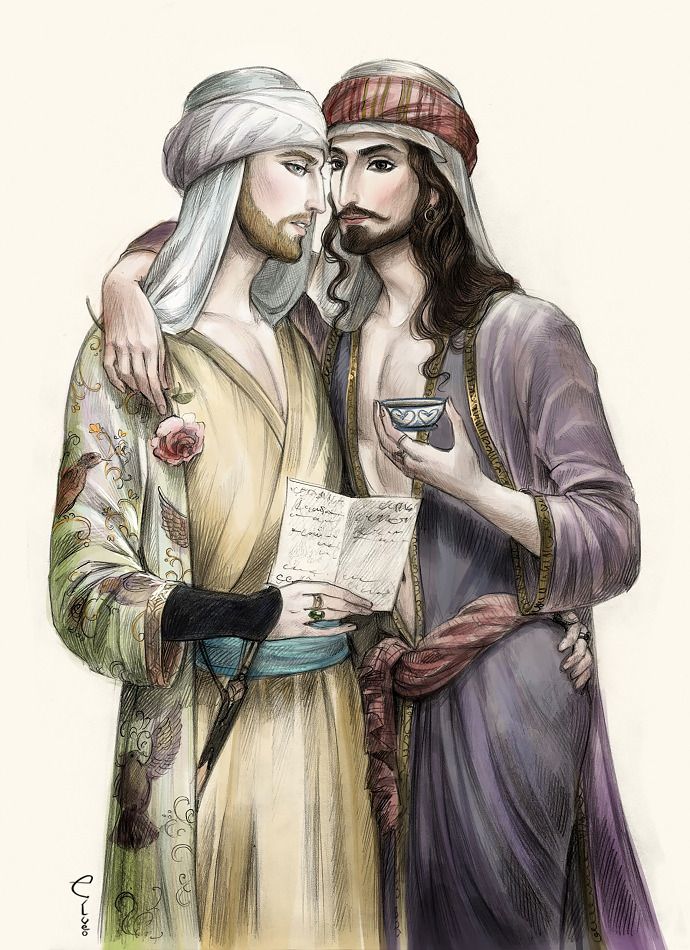In an Abrahamanic world where eroticism is a sin, homo-eroticism is something that is beyond the very realms of sinning. But there was a Muslim poet, 1200 years ago, who immortalized homo-eroticism in his poems without the fear of being killed or ostracized. Abu Nuwas, one of the greatest classical Arab poets in history has a past that is cherry-picked and showcased to the world today. A man who wrote some of the most seductive poetry for multiple gender relationships now lies forgotten in the annals of history.

Origins of Nuwas
Born to a Persian mother and Arab father in the city of Ahvaz in modern day Iran, Abu Nuwas Al-Hasan ibn Hani Al-Hakimi, began his early education in literature at a very young age. His father, Hani was a soldier in the army of the Abbasid Caliph Marwan II but he never met his father and did not know much about him. His mother, Jullaban, was a weaver. The name his mother gave him at birth was Al Hasan but people often called him Abu Nuwas which means ‘The Father of the Locks of Hair’, because of two long side-locks that came down till his shoulders.
A center of learning at that time, Basra was the city that gave Abu Nuwas his first launch pad to the world of Arabic literature. He received tutelage from the legendary Basran poet Walibah ibn Al Hubab and then later in the city of Kufah, under Khalaf Al-Ahmar.

The Thirst for Knowledge
Abu Nuwas was a seeker of knowledge. He would often venture out in unknown villages and towns, listening to stories from people, getting to know how different relationships works. He began understanding and making notes about gender roles at the tender age of 14, when on the other hand most men of that time would spend learning how to fight.
He memorized the Quran and the Hadiths at a very young age, but he knew that the Arabic of the Quran was too elitist and ornamental. And so he spent a year with the Bedouins of Arabia, learning the roots and acquiring the purity of Arabic language.
A City of Gold
After he had built a name for himself in the smaller cities around Iran and Iraq, he decided to up his game and he ventured out into the city of gold, Baghdad. The capital of the Abbasid Caliphate, Baghdad was one of the greatest cities of that age. A center of trade, art, and literature, Baghdad was a diamond mine for Abu Nuwas. But his first appearance in the court of Baghdad went unnoticed.
The Barmakids, viziers of the Abbasids, gave him patronage. But when the Barmakids fell, he had to flee to Egypt to save himself from Harun Al Rashid, the then caliph of the Abbasids. It is said that it was Harun’s brother Al-Hadi who forced him to run away, and he returned to Baghdad when Harun took over the throne.

In Pursuit of Pleasure
Though Abu Nuwas preferred to use the more rustic and pure Arabic of the Bedouins in his poetry, his themes were very urban rather than desertish. He initially began writing about daily life and how religion intertwined with everyday relationships. Later as he began exploring the idea of human sexuality, his poems were centered around pederasty and homo-eroticism. A lot of critics say that he wrote about homo-eroticism and the entire idea of pederasty emerged so that Muslim clerics could mar the legacy of Nuwas by calling him a pedophile or a sodomizer.
Abu Nuwas was completely unabashed while describing the kind of lovers he desired all his life. His poems are rife about descriptions of beautiful men in bathhouses or hamaams. A complete disregard for the rules of haraam and halaal in Islam, Abu Nuwas centered his poems around the idea of homosexuality and wine, both of which are haraam in Islam.
Khamriyyat – Wine Songs
Hedonistic poetry centered around wine drinking and sexual intercourse is something that you would generally associate to the Europeans. But Abu Nuwas changed this perspective when he wrote some of the most fiery verses in favor of all kinds of wine drinking and multi gender relationships revolving around sexual intercourse. He considered intercourse as a natural need of man, which it factually is. He made a distinction between love and lust, without referring to lust as sinful or derogatory.

Lost in Lore
In 2001, the Egyptian Ministry of Culture burned roughly 6000 copies of Abu Nuwas’s poetry, deeming it as homoerotic and dergoatory to the religion of Islam. A lot of his precious works were lost. But a huge chunk of his work still survives in different libraries around the world, hidden within the heaps of mainstream Arabic poetry. The Father of Erotic Arabic Poetry is just a lore in the land where he was a legend.

These are two of his most famous poems titled In The Bath House and Love in Bloom, translated by Victor Monteil.
In the Bath House
In the bath-house, the mysteries hidden by trousers
Are revealed to you.
All becomes radiantly manifest.
Feast your eyes without restraint!
You see handsome buttocks, shapely trim torsos,
You hear the guys whispering pious formulas
to one another
(“God is Great!” “Praise be to God!”)
Ah, what a palace of pleasure is the bath-house!
Even when the towel-bearers come in
And spoil the fun a bit.
Love in Bloom
I die of love for him, perfect in every way,
Lost in the strains of wafting music.
My eyes are fixed upon his delightful body
And I do not wonder at his beauty.
His waist is a sapling, his face a moon,
And loveliness rolls off his rosy cheek
I die of love for you, but keep this secret:
The tie that binds us is an unbreakable rope.
How much time did your creation take, O angel?
So what! All I want is to sing your praises.
